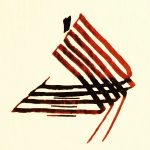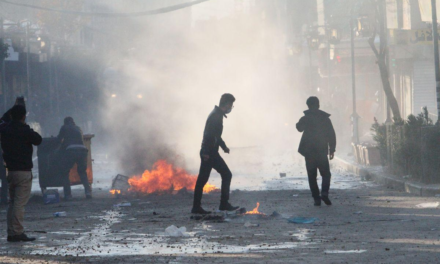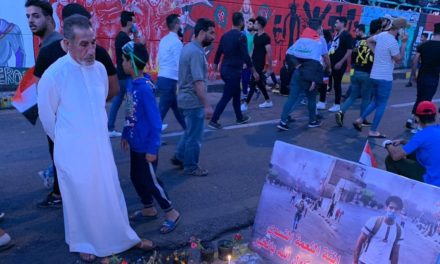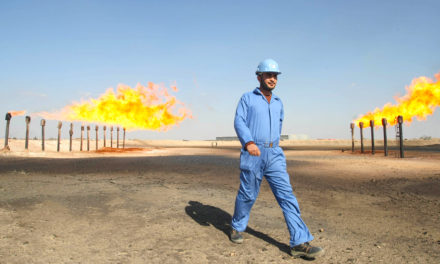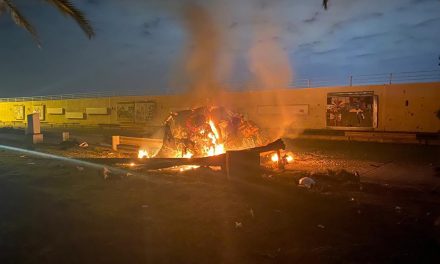(Photo: Delil Suleiman/AFP)
Although much focus has been given on the Turkish incursion into North Eastern Syria, where Turkey aimed at clearing its border from PKK-affiliated forces, another Turkish campaign into Iraq’s Kurdistan has targeted the PKK itself. And while the incursion into Syria was met with both international and Iraqi Kurdish protest, there are no seemingly notable protests against the Turkish attacks inside Iraqi Kurdistan, a campaign which has led to the ‘neutralization’ of dozens of PKK members, but has alarmingly also caused numerous civilian casualties. Turkey’s increasing military and economic influence in both Kurdistan and Iraq, in addition to its control of water resources, offers an explanation.
The Turkish Military Campaign
The campaign in Kurdistan, named “Operation Claw,” started on May 27, 2019 and entered its third phase in August. Since the beginning of November, Turkey has intensified its operations in Kurdistan, using warplanes, drones and artillery to target the Kurdistan Workers’ Party (PKK) and its allegedly affiliated military groups such as Yezidi Militias in Sinjar. For decades now, the PKK has used the Qandil mountains in Kurdistan as its headquarters in its insurgency against Turkey. Equally for decades, Turkey has been militarily active in these mountains, with Turkey and Iraq agreeing in 1983 that Turkey can freely operate within 20 kilometres inside Iraqi territory in order to protect its borders.
The goals of “Operation Claw” are similar to Turkey’s insurgency in Syria, namely “to disrupt PKK mobilization in the Hakurk region; to create a buffer zone along the Turkey-Iraq border; and to reduce PKK dominance in the Sinjar region that is used as a transit route between Iraq and Syria.” Meanwhile, the Turkish insurgency in northern Syria is affecting Kurdistan through the thousands of Kurdish and Arab Syrians fleeing both from the Turkish assault and the Syrian National Army pouring into the region. Furthermore, there is concern in Kurdistan that the chaos resulting from the Turkish invasion in its neighbouring country will lead to the reemergence of Da’ish, which currently operates as a small, largely autonomous guerrilla movement.
A divided stance against Turkey’s Syria campaign
There have been fierce Iraqi Kurdish protests against Turkey’s recent assault in Northern Syria. Al-Monitor reported that the Turkish campaign into Syria has united Iraqi Kurds from different factions in an “unprecedented display of pan-Kurdish solidarity.” This includes Iraqi Kurdish leaders who are usually cautious in their reaction to Turkey. The Kurdish Regional Parliament, for example, called upon Turkey to halt its military campaign in Syria’s Kurdish regions. However, Iraqi Kurdish officials have not completely overcome the discrepant views of the two competing parties in Kurdistan, namely the Patriotic Union of Kurdistan (PUK: close ally of Iran), and the ruling Kurdistan Democratic Party (KDP: close ally of Turkey). The powerful Kurdish leader Nechirvan Barzani, defended Turkish assaults in Syria, stating that it is “aimed at terrorists.”
While there is some official Kurdish condemnation of Turkey’s campaign in Syria, Kurdish authorities will not go as far as upsetting Turkey by strongly opposing the Turkish military actions in Syria, despite the dangers that the Turkish campaign in Syria poses to northern Iraq by aggravating the chances of Da’ish reemergence and causing a significant influx of refugees to the region.
Consent on “Operation Claw”
In the case of “Operation Claw,” there is no official condemnation by Erbil at all. On the contrary, the Kurdish Peshmerga have even actively supported Turkish efforts. This support came in the backdrop of the government facing criticism over Turkish impunity in the battle against the PKK, and despite the fact that the military campaign has led to civil casualties and has destroyed farmland. Turkey’s free hand in Kurdistan and a lack of protest from the Kurdish side can be explained by looking at Turkey’s military and economic role Turkey in the region, as well as its control over vital water resources.
From a security point of view, not only the Turkish incursion into Syria, but also Iraqi calls for US troop withdrawal are leaving the Kurdish areas anxious of a Da’ish reemergence. The US military presence currently guarantees security in Kurdistan. However, the region also has a good relationship with Iran, and it does not want to risk incurring any wrath over collaboration with the US. Still, it needs a foreign military force to guarantee its security, seeing as there is a lack of coordination between different Iraqi forces and Da’ish’s hideouts are difficult to penetrate. Furthermore, collaborating with Turkey, with its sophisticated technology and professional military capacity, might offer a lucrative alternative for the Kurdish Regional Government.
Concerning Turkey’s economic influence, it has promised big economic investments in Iraq. For example, at the Kuwait Conference for the Reconstruction of Iraq that was held in Kuwait in February 2018 Turkey announced 5 billion USD in credit and 50 million USD in project-based assistance for Iraq. More recently, in August of 2019, the Turkish Ambassador to Baghdad, Fatih Yildiz, urged Turkish companies to look for opportunities to rebuild Iraqi airports, especially in Kirkuk, Dhi-Qar and Mosul. In the case of Kurdistan, Turkey represents a vital economic lifeline as its oil is exported to and through Turkey. Furthermore, many Turkish companies do business and invest in Kurdistan, for example, in the field of infrastructure. As a result, many Turks have also settled in Kurdistan to establish businesses.
Lastly, Turkey also gains political leverage over Iraq through its dams by which it controls the Euphrates and Tigris, both rivers of which Iraq is downstream. Turkey is investing in more dams with its ‘Anatolia Project’, including the contested Ilisu Dam, threatening critical water shortages in Iraq and causing an overall loss of ecosystems and wildlife in the whole of the Tigris-Euphrates basin. Iraq has previously claimed it has lost over 80 percent of its water due to Turkish dams, and with the current protests and instability threats from militias in the country as well as a potential Da’ish reemergence, it cannot afford more water shortages causing frustration by affecting agriculture, fishing, and drinking water. Water is power, and Turkey is not budging when it comes to its using it as a political instrument.
To conclude, the Turkish campaign in Syria illustrates the divide within Iraqi Kurdistan when it comes to condemning the Turkish military actions. In the case of “Operation Claw”, however, there is consensus on a lack of opposition. This can be explained through the prism of Turkey’s military and economic influence in both Kurdistan and Iraq, and its control over much of Iraqi’s water resources.
The menace of Turkish attacks revolves around civilian casualties, and the potential of those who are fleeing from Syria getting caught in their crosshairs. Authorities in Iraq and Kurdistan have already expressed fears that Turkey will mimic their Syrian incursion in northern Iraq with Turkey already killing and wounding civilians when targeting the Yezidi-dominated Sinjar, near the border with Syria, and Kurdish villages in Duhok, near the Turkish border, during their efforts to disrupt PKK supply lines, safe havens and command centres.
